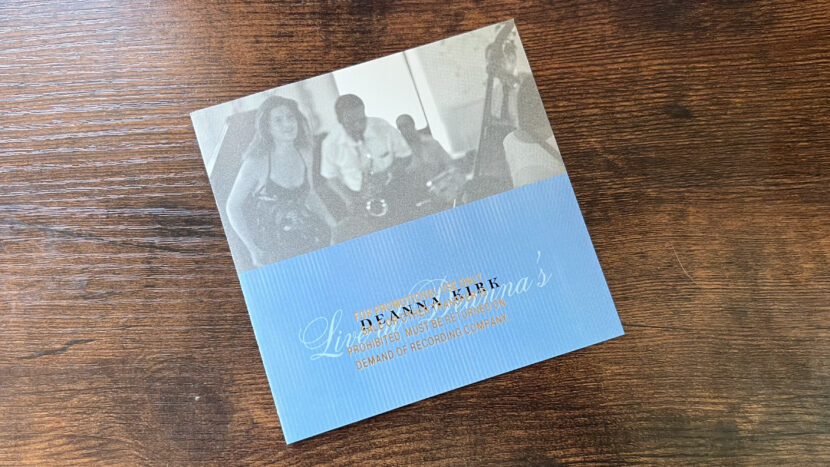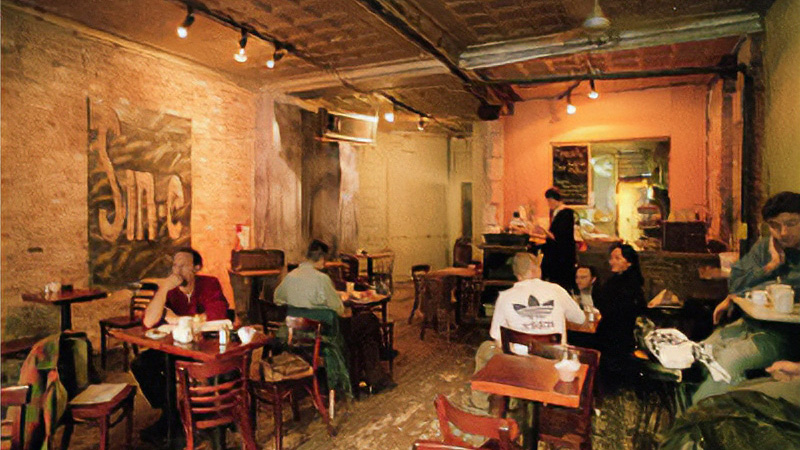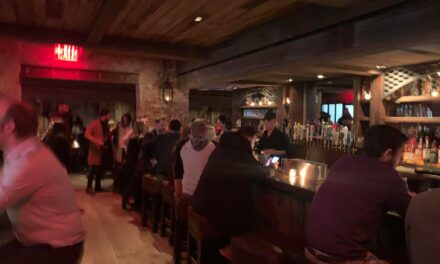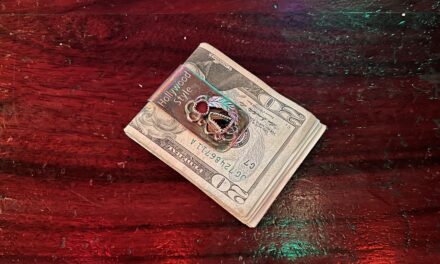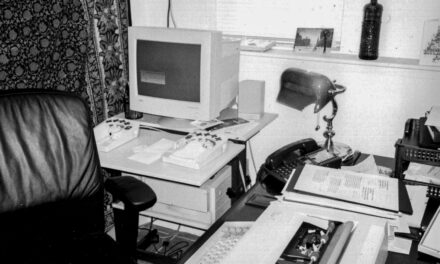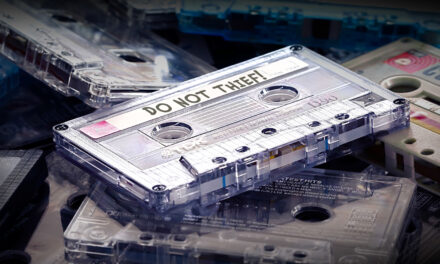In my early 20s, there was a café that felt like home to me in NYC’s East Village. Pronounced “shin-AY”, in Irish Gaelic its name meant “here.” It was small and cozy, warm in the wintertime, with creaky wooden floors at the street level of a small old apartment building. Pink sponge-painted walls all around, and a sheet-metal logo on the left side.
Sin-é
I liked to hang around there, but I was not a coffee drinker at that time. Sometimes I would order a cappuccino and load it up with sugar and cinnamon. Or iced tea. I think they served pastries, and I remember often enjoying a small crock of Irish Stew.
It was empty enough that people could come and read a book or newspaper for hours without being rushed or asked to clear the table for the next customer.
Every evening there was music, and I thought that was just glorious. In such a small venue, you could be inches away from the performer. And at that age I had feelings about the importance of living authentic experiences rather than recordings or reproductions.
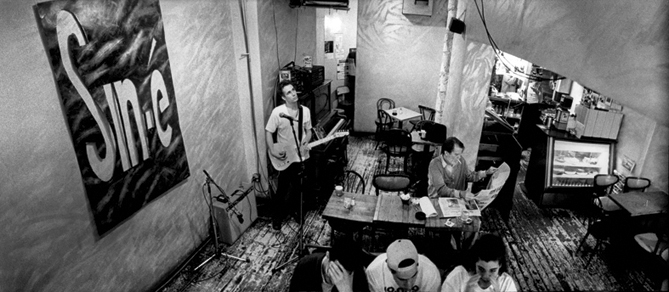
Sin-é did not have a license to sell liquor, or even beer & wine, which is a big part of why I loved it.
See, I started my full-time professional career when I was 18. After work, my co-workers would go to bars where the legal age was 21. Even as a non-drinker, I was usually denied entry at the door, humiliated time and again. I would watch my group shrug apologetically, then walk through the doorway as I was turned away to retreat home alone and miss the evening. I learned to avoid anyplace where that might happen.
At Sin-é, I could sit among coffee-drinkers and newspaper-readers in the daytime, then hear a live musician in the evening, and feel very much like an adult. Nobody asked my age or checked my ID. I enjoyed this place well after turning 21. It was safe.
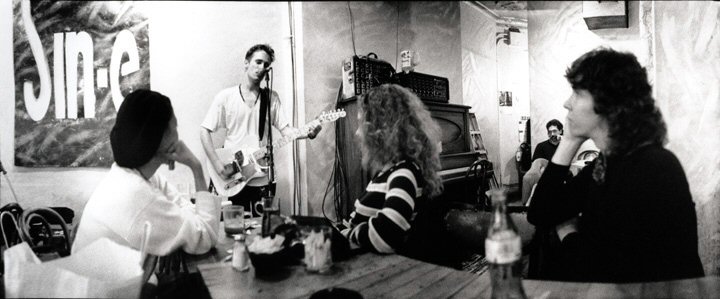
The Rolling Rock
New York City being as it is, the lack of a license didn’t stop this little café. They actually did sell beer, just without a permit. Rolling Rock in a bottle was the only choice. So in the evenings, each tiny table would eventually grow a centerpiece of empty green glass Rolling Rock bottles.
They didn’t want a paper record of selling alcohol, so the waitstaff always wrote “Cappuccino with Cream” instead of “beer”. A table of four might end the night with a check for “12 Cap. w/ Cream”.
It tickled me to imagine someday a city inspector confronting the owner with a stack of these, to be answered by a shrug and an accent of Irish charm, “IDK, sure my customers often have ten coffees a night”.
Even though Sin-é sold beer, they didn’t bother checking IDs because the whole thing was illegal anyway. As far as I know, this lasted many years without any kind of trouble.
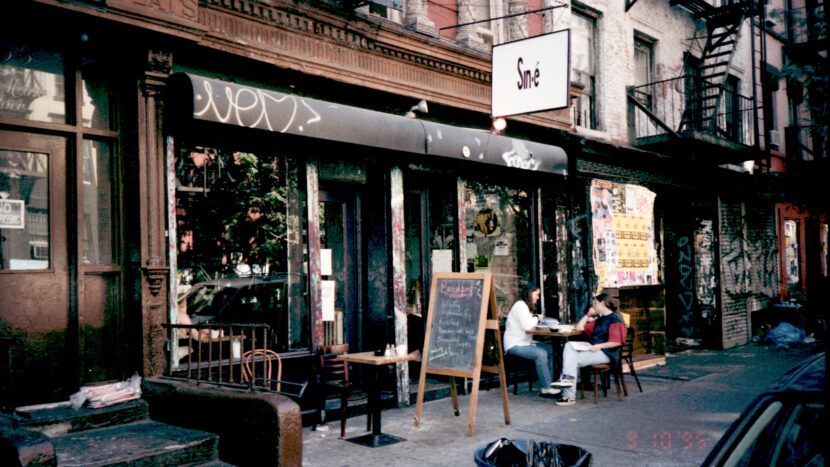
Deanna
On some evenings, the musical act was a pair of women. One spoke Gaelic and played traditional Irish instruments. Song lines of melodic poetry, emotion transcending an incomprehensible language, transported me far from that corner of the big city. I felt spirited to another country or even a mythological time, perhaps an Elvish land from a Tolkien story.
The other was a blues singer named Deanna. She would end her sets with a sultry whisper, “Some day I’m going to have my own place, so I can sing every night, instead of just on Wednesdays. To you three people.”
I preferred the quiet weeknights, but Deanna was right that very few people came on those days. Weekends, Sin-é was crowded with rising-star rock bands. I didn’t like to be alone in crowds. Being jostled by large groups of older people who were drinking… was not for me.
In an empty room, a shy young man alone might have a chance to meet a friend. But not when everyone’s in big groups and shouting with the friends they already have. The bustling weekend evenings would only make me feel like an outsider.
Deanna’s
A few years later, walking the streets of that same neighborhood, I saw a new place had opened exactly one block from Sin-é. There was a simple sign overhead, “Deanna’s”.
I flushed with excitement, and muttered out loud, “No… it can’t be…” Could that new café possibly belong to the Deanna who ended every set on stage by affirming she’d one day have her own?
Rushing across the street, I opened the door and burst into the packed venue. A fancy group of musicians were in the midst of an intense performance. I saw double-bass, guitar, saxophone… and there was Deanna in a cocktail dress, leaning against the piano and singing the blues.
When the set of songs ended, she looked around the room and offered, “I have one copy left of my CD. Who’s going to buy it?” Of course that was me.
Seeing her dream come true renewed my confidence of goodness in the world.
